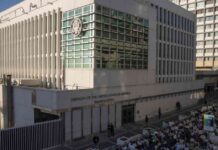U.S. authorities have recently made a significant breakthrough in the case of the tragic human smuggling attempt that resulted in the deaths of 53 migrants in a sweltering tractor-trailer in San Antonio. Rigoberto Román Mirnado Orozco, a Guatemalan national, has been indicted on six counts of migrant smuggling resulting in death or serious injury, marking the deadliest attempt from the U.S.-Mexico border.
The investigation into this horrific incident has been ongoing for several years, with more than a dozen arrests made in connection to the 2022 deaths of the migrants. The latest developments have seen arrests stretching all the way to Central America, with Guatemalan officials announcing the apprehension of seven individuals accused of aiding in the smuggling operation. Among them is the alleged ringleader, whose extradition to the United States has been requested.
Interior Minister Francisco Jiménez highlighted the collaborative efforts between Guatemalan authorities, Homeland Security, and other national agencies in dismantling the structures of human trafficking. The arrests were made possible after 13 raids in three departments of Guatemala, where police seized vehicles, cash, and rescued additional migrants during the operations.
The tragic incident unfolded when a tractor-trailer containing migrants was found in San Antonio, with a malfunctioning air-conditioning unit leading to the deaths of 48 individuals. Another 16 migrants were taken to hospitals, where five more succumbed to heat-related illnesses. The victims hailed from Mexico, Honduras, Guatemala, and El Salvador, underscoring the international scope of the smuggling operation.
Homero Zamorano Jr. and Christian Martinez, both from Texas, were among the six individuals previously charged in connection to the smuggling attempt. Martinez has since pleaded guilty to smuggling-related charges, while Zamorano awaits trial after pleading not guilty. Additionally, four Mexican nationals were arrested in 2023 for their involvement in the operation.
Authorities have uncovered evidence suggesting that the men involved in the smuggling operation were aware of the dire conditions inside the trailer but chose to proceed with the journey regardless. Migrants paid exorbitant fees of up to $15,000 each to be transported across the border, with the organization offering up to three attempts to enter the country.
The arrests in Guatemala have shed light on the extensive network of human smuggling operations that span multiple countries, with routes, guides, stash houses, trucks, and trailers shared among the perpetrators. The alleged ringleader, Orozco, was apprehended in the department of San Marcos, near the border with Mexico, while other arrests took place in Huehuetenango and Jalapa departments.
It is worth noting that several of those arrested in Guatemala are related and share the Orozco surname, indicating potential familial ties within the criminal network. Guatemalan officials have accused the group of facilitating the housing and transportation of hundreds of migrants to the United States over several years, highlighting the scale and longevity of their illicit activities.
The tragic loss of 53 lives in this smuggling attempt serves as a stark reminder of the dangers faced by migrants seeking a better life through unauthorized means. While the perpetrators of such crimes must be held accountable for their actions, it is equally important to address the root causes of irregular migration and provide safer, legal pathways for individuals to pursue opportunities in a transparent and humane manner.
International Cooperation in Combating Human Trafficking
The coordinated efforts between U.S. authorities and their counterparts in Guatemala underscore the importance of international cooperation in combating human trafficking and smuggling. The arrest of the alleged ringleader in Guatemala represents a significant step towards dismantling the criminal networks responsible for preying on vulnerable migrants seeking a better future.
Interior Minister Jiménez emphasized the strategic objectives of the Guatemalan government in tackling the phenomenon of irregular migration, highlighting the need for a multi-faceted approach that addresses both enforcement and prevention strategies. By targeting the structures of human trafficking at their source, authorities can disrupt the flow of illicit activities and protect potential victims from falling into the hands of ruthless smugglers.
Implications for Immigration Policies
The tragic incident in San Antonio serves as a wake-up call for policymakers and stakeholders involved in shaping immigration policies and practices. The high human cost of unchecked smuggling operations underscores the urgency of implementing comprehensive reforms that prioritize the safety and well-being of migrants while upholding the rule of law.
As countries grapple with the complex challenges posed by irregular migration, it is essential to strike a balance between security concerns and humanitarian considerations. By addressing the root causes that drive individuals to embark on perilous journeys in search of a better life, governments can create a more sustainable and humane approach to managing migration flows.
Humanitarian Response and Support for Survivors
In the aftermath of the tragic events in San Antonio, efforts to provide humanitarian assistance and support to survivors must be prioritized. The survivors of the smuggling attempt, many of whom have endured unimaginable hardships and trauma, require access to essential services, including medical care, psychosocial support, and legal assistance.
Non-governmental organizations, civil society groups, and international agencies play a crucial role in complementing government-led responses to humanitarian crises. By mobilizing resources and expertise to address the immediate and long-term needs of survivors, these stakeholders can help rebuild shattered lives and restore dignity to those who have suffered at the hands of ruthless smugglers.
As the investigation into the deadly smuggling attempt continues to unfold, it is imperative that justice is served for the victims and their families. Holding the perpetrators accountable for their actions sends a clear message that such heinous crimes will not go unpunished and deters others from engaging in similar illicit activities.
In conclusion, the indictment of Rigoberto Román Mirnado Orozco and the arrests made in connection to the tragic deaths of 53 migrants in San Antonio represent a step towards justice and accountability. By working together to dismantle human trafficking networks and address the root causes of irregular migration, authorities can prevent future tragedies and uphold the values of dignity, respect, and compassion for all individuals seeking a better life.






















